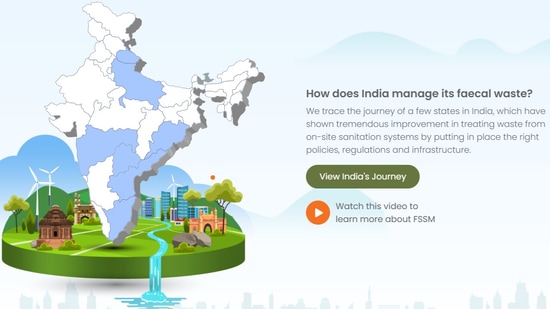How does India manage its faecal waste? NFSSM traces key policies implemented by states
Comprehensive infographics on the ‘India for the World’ platform showcase the “best practices, case studies, and step-by-step implementation milestones and sanitation outcomes” for the entire country, as well as specifically for a few key states
The National Faecal Sludge and Septage Management (NFSSM) Alliance, an umbrella body of organisations that are engaged with faecal sludge and septage management in India, on Friday today launched ‘India for the World’ – a platform tracking the key work being done for safe and sustainable sanitation practices in the country. In an official release, the NFSSM Alliance said that the ‘India for the World’ web platform provides an “orientation” to the background of the waste management sector, highlighting the progress so far and future directions aimed at the city, state, and national levels.

Comprehensive infographics on the platform showcase the “best practices, case studies, and step-by-step implementation milestones and sanitation outcomes” for the entire country, as well as specifically for a few key states – Uttar Pradesh, Uttarakhand, Maharashtra, Tamil Nadu, Andhra Pradesh, Telangana, and Odisha.
The infographic also showcases the steps taken by the aforementioned state governments to build cost-effective and inclusive urban sanitation programs – recognising sanitation as a crucial part of urban development and sustainability.
Sakshi Gudwani, a senior programme officer at the Bill & Melinda Gates Foundation and also a member of the NFSSM Alliance, said, “India has made tremendous progress in improving access to toilets and is prioritising the treatment of human faecal waste – many states and cities have implemented innovative and scalable solutions for FSM and inclusive sanitation service delivery.”
“It is imperative that the learnings from this progress are well-documented and disseminated to other states and cities within the country to replicate and for the world to learn from the great work that is happening in India,” she said while speaking of the ‘India for the World’ web platform. “It (the infographic) shares learnings on implementing effective FSSM and inclusive sanitation service delivery solutions.”
Hosted on the NFSSM Alliance official website, the ‘India for the World’ series of infographics depict replicable and scalable models of faecal waste management by various cities and states across the country. According to an official release, these models speak of innovations in areas such as improving operations efficiency by building capacities of sanitation workers as entrepreneurs, exploring diverse sources of finance to move towards operational sustainability, and using technology to eliminate the need for direct human contact with faecal waste – among many others.
According to estimates provided by the sanitation body, about 60 per cent of our urban population today depend on onsite sanitation systems, which require dedicated planning for faecal waste management – prioritising human excreta management, a waste stream with a high potential for spreading diseases.
The planning strategies entail emptying, transportation, treatment, and safe disposal of waste and possible reuse of output products post-treatment. The web platform covers several multi-professional and low-cost sanitation programs which are implemented according to physical and socio-economic conditions ensuring proper service to everyone.






